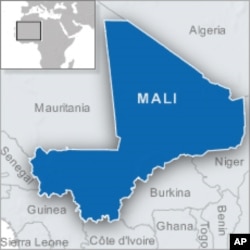Burkina Faso's border with Mali stretches from the Tuareg rebel-controlled deserts of the north to the populated south, now governed by a military junta that seized power in late March.
According to the Red Cross, most Malian refugees find themselves in northern Burkina Faso after fleeing the well-armed and advancing Tuareg rebels. But government spokesman Alain Traoré says Burkina Faso is experiencing fallout all along the border with its northwestern neighbor.
Traoré says that when the conflict zone that was in the north moved toward the capital for other reasons, the impact is the same and they are very worried.
The influx of refugees will likely place further strains on one of the world's poorest economies, but the political situation in Burkina Faso is just as tenuous and could worsen as a result of regional instability.
President Blaise Compaoré, who himself came to power by way of a coup in 1987, is the latest African head of state looking to prolong his tenure in the face of term limits. Like many of his regional counterparts, he is responding with constitutional reforms that will allow him, in his case, to run for a fifth term in 2015.
Edouard Ouédraogo is president of the Burkina Faso chapter of the Research Group on the Democratic, Economic and Social Development of Africa. Ouédraogo says that the laws of the land are often put aside, which, he says, is unfortunate but seems to have become the sport of most countries.
He adds that this fragility is because these countries are only apprentices of democracy and they don't always have the political personnel they need to mend things.
Ouédraogo hopes that the president will not seek re-election in 2015, and he is not alone. Last year, discontent over perceived corruption and the rising cost of living erupted in general protests against the government and a military mutiny.
Much of the military has since been appeased with increased allowances, but Aminata Ramdé has not seen any changes in the capital of Ouagadougou. Ramdé says that, simply, life is very expensive. She says that her family tries to make ends meet, but they just don't.
Prices of staple goods have continued to rise since the food security crisis of 2008 - a reflection and a cause of the growing food crisis in West Africa's Sahel region. The United Nations estimates that in Burkina Faso, some three million people, or 17 percent of the population, are at risk of malnutrition.
Although Burkina Faso imports most of its food, James Francis, an analyst with the Eurasia Group, says that the government can control prices to some extent and failure to do so could re-ignite tensions.
"There will certainly be protests in urban centers," he said. "However, I don't see food prices, at least in the short or medium term, really causing any sort of political unrest in the country."
But with the added stresses of Malian refugees, the cost of living could become difficult to contain. Francis said that in 2015, the government will have to answer to the electorate and an international community that is increasingly intolerant of leaders overstaying their welcome.




